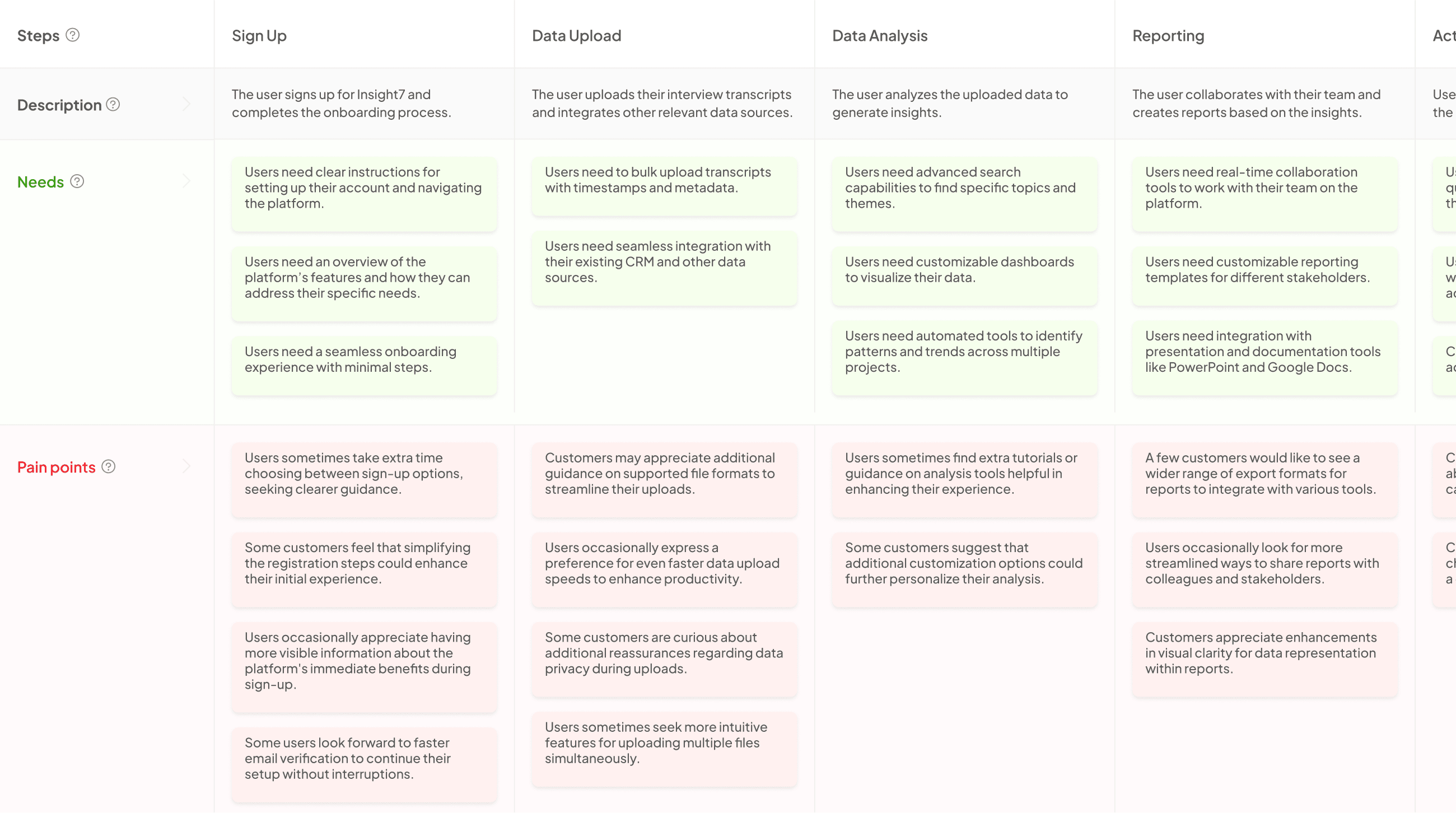In the rapidly evolving world of business-to-business (B2B) relationships, the customer journey has become a focal point for companies aiming to enhance customer experience and drive growth. With the advent of artificial intelligence (AI), customer journey mapping has transcended traditional boundaries, offering real-time insights and trend analysis that were once inconceivable.
In this context, AI-generated B2B customer journey mapping emerges as a transformative tool, enabling organizations to decipher complex customer data and extract actionable insights with unprecedented speed and accuracy.
Extract insights from Customer & Employee Interviews. At Scale.

Understanding the Customer Journey in the AI Era
The customer journey in a B2B context is intricate, often involving multiple touchpoints, decision-makers, and extended sales cycles. Traditionally, mapping this journey required extensive data collection and analysis, a process that could span weeks or even months. However, the integration of AI technologies has revolutionized this process, condensing the time required to gather, analyze, and interpret customer data.
AI-driven platforms, like the one described by the organization in question, harness the power of machine learning and natural language processing to understand conversations, identify trends, and segment customers in near real-time. This technology enables businesses to swiftly adapt to customer needs, pinpoint pain points, and tailor their offerings accordingly. The ability to conduct thematic analysis of customer interviews or conversations with a simple click is a testament to the efficiency and depth of insights that AI can provide.
The Role of E-E-A-T in Customer Journey Mapping
When leveraging AI for customer journey mapping, it is essential to adhere to the principles of E-E-A-T – Experience, Expertise, Authoritativeness, and Trustworthiness. These principles ensure that the content generated from AI analysis is not only accurate but also resonates with the intended audience. By aligning AI-generated insights with E-E-A-T, organizations can create a customer journey map that is both informative and credible, thereby enhancing their search engine rankings and establishing themselves as thought leaders in their industry.
The organization’s approach to integrating AI with customer journey mapping exemplifies a commitment to these principles. By providing a dashboard that offers an overview of customer pain points, desires, and opportunities, and the ability to delve into each theme to understand its sentiment and impact, the organization demonstrates expertise and authority in the field. The inclusion of evidence behind each insight further reinforces the trustworthiness of the analysis.
Generate Journey maps, Mind maps, Bar charts and more from your data in Minutes
Real-Time Insights for Agile Decision-Making
The agility afforded by AI in customer journey mapping is a game-changer for B2B organizations. With the ability to track product sentiment across a portfolio in real-time, product teams can make informed decisions swiftly, staying ahead of the curve in a competitive market. The integration of AI research assistants that can generate ideas for solutions to customer problems is another innovative feature that enhances the decision-making process.
Moreover, the AI platform’s capability to segment customers by various attributes, such as revenue and industry, allows for a granular understanding of different market segments. This level of detail is crucial for businesses to prioritize their efforts and customize their strategies to meet the unique needs of each segment.
The Impact of AI on Content and Marketing Strategies
AI-generated insights are not limited to improving products and services; they also play a significant role in shaping content and marketing strategies. By analyzing customer feedback across channels and identifying key themes, AI helps in crafting targeted messages and content that resonate with the audience. This data-driven approach to content creation ensures that marketing efforts are aligned with customer expectations and industry trends.
The organization’s AI platform goes a step further by enabling the generation of blog posts and marketing strategies based on customer data. This feature empowers marketing teams to produce relevant and impactful content with ease, leveraging the insights gleaned from customer interactions.
Conclusion
AI-generated B2B customer journey mapping is a powerful tool that offers businesses a comprehensive and nuanced understanding of their customers. By providing real-time insights and the ability to act on them quickly, AI not only streamlines the customer journey mapping process but also enhances the overall customer experience. As organizations continue to embrace AI in their operations, the potential for growth and innovation in B2B customer journey mapping is boundless.
Extract insights from Customer & Employee Interviews. At Scale.

💬 Ask About This Article
Have questions? Get instant answers about this article.


